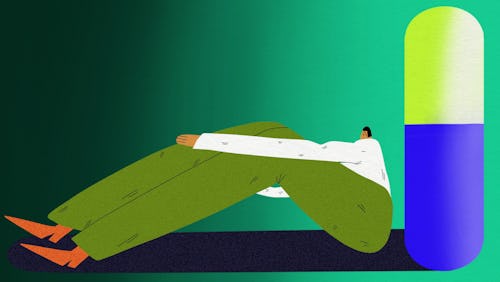
I never get over the weirdness of introducing myself to a group of people at a 12-step meeting. “Hi, I’m T and I’m an addict,” is how I have started a lot of conversations. Other people in recovery are accustomed to this. It’s one of the ways we show each other that we’re all in the same boat. It’s an acknowledgement that no matter how different we are, we all share the same struggle.
For people outside of recovery communities, it may seem like a bizarre overshare or some kind of self-flagellation. No matter how far we’ve come as a culture in reducing the stigma of addiction, that stigma is quite sticky and it clings to language. People who don’t have a lot of experience with addiction almost always look away when I start talking about it. They often get uncomfortable or start adding more palatable descriptors to make up for what they seem to read as a startling confession. “You’re more than that,” they might say and then go on to list my positive character traits as they see them.
This is kind but it’s not always helpful because sometimes, “I am an addict” is only the beginning of a sentence. Most recently what I actually need to communicate to the people who care about me is that I’ve recently relapsed. Most other people who identify as having a substance abuse problem will have some idea that the terrain of relapse is vast and expansive, but for the general population — we call y’all “normies” — relapse brings up images of failure, financial ruin, overdose, and death.
During my most recent relapse, it became clear to me that the people who love me have little awareness of what it entails. And while they sometimes desperately want to be helpful and caring, they have no idea what to do.
There are two poles of what most people imagine when they think of relapse — either they get scared that my death is imminent and I must be watched or they kind of think it’s not really a big deal because here I am doing yoga and going to work. The reality is often somewhere in the middle — I probably need a little more attention than usual, but I don’t need help tying my shoes, thanks.
It makes sense for laypeople to be confused because even amongst professionals in addiction recovery, there isn’t really an agreed-upon definition of what relapse means. I asked more than 20 addiction specialists to define relapse for this article and I got more than 20 different answers. Most pros are very aware of the reality that relapse can mean a lot of different things.

“In the recovery sense, a relapse is whenever somebody has an established period of clean time and picked drugs back up,” says Steven Hall, a therapist and founder of a recovery center in Maryland. “In a clinical setting, a relapse is defined as any time remission from a disorder is broken by a return to a maladaptive pattern, particularly returning drug use after abstinence has been achieved.” I prefer the latter definition because the idea of “returning to a maladaptive pattern,” is actually what relapse feels like for me. It means: “I used to do this crazy shit that was bad for me to cope. I stopped doing it for a while, but then I started doing it again.”
For me, the return to negative patterns of behavior and thought define the relapse experience. Everyone can identify with this, I think. Even if you’ve never misused substances or engaged in addictive or compulsive behavior, you know what it’s like when for a while you were coping with life in a healthy way and you felt good and strong and maybe even happy and then something happened and you stopped doing the healthy things. And life didn’t seem so good anymore. Put in those terms, most people instinctively know how awful that feels, even if it’s not life-threatening.
The return to negative patterns of behavior and thought define the relapse experience.
What really gets to most of us in those moments when we did something that we promised ourselves we would never do again is the shame of it. “Regret is one thing, but shame is destructive,” says Jeff Chervenak, a Connecticut-based therapist and recovery coach. And, Chervenak adds, “Shame is more likely to lead to relapse than prevent it.” In other words, shame induced by relapse can create a vicious cycle that leads to another relapse. Ouch.
To be clear, most of the shame people feel as a result of relapse is not the result of being judged by others. “Shame around relapse tends to be generated by the person that relapsed,” says Hall. “It’s not something that’s openly shamed or looked down upon by other members of recovery fellowships, the way it is internally by the person who decided to use.”
No one in any recovery community or anyone I love has ever chided me for relapse. But because the stigma of addiction persists, how can I not internalize it when I am weak? Can any of us?
The reality is that shame creates a hindrance that feels debilitating. “In many ways, reducing shame is the biggest challenge as treatment professionals,” says Joseph Volpicelli, a psychiatrist who specializes in addiction and director of the Institute of Addiction Medicine in Pennsylvania. One of the causes of shame during relapse is the notion that relapse somehow erases everything good a person has gained in recovery. “When relapse is defined in all or nothing terms, it lends itself to a sense of hopelessness and shame,” he adds.
That’s why if you or someone you care about is dealing with relapse, it’s important to focus on recovery as a process and not a goal. In this way, relapse can be seen as part of that process instead of viewed as the loss of a gain. “There’s no way you can tell me that someone who’s been clean for 10 years and then used for a month or even a few years threw away all of the growth and experience of being their true selves,” Hall says. This is true — but it can be really hard to remember when I’m in pain and feel like I have broken promises to myself and other people.
A balance of acceptance and accountability is crucial when dealing with relapse. “If someone with a long history of sobriety does relapse, they probably do have some work to do to figure out what happened, but that’s not starting over — it's continuing,” says Hall. We all need a reminder that one mistake doesn’t make or break our lives and relationships sometimes, and that awareness tempered is exactly what someone experiencing relapse needs from themselves and the people around them. That, a plan, and a support system.
It’s also important for the loved ones of people in recovery to take good care of themselves.
When someone you care about relapses, it can be easy to either check out and “leave it to the professionals,” or try to take them on as your new savior project. Nope. “It is crucial to not absorb all the consequences of a relapse and to hold your loved one accountable,” says Volpicelli, “It is equally important to avoid blame and judgment.” Instead, he says, try to understand the factors that contributed to the relapse and offer to help them in ways that you are qualified to do. You cannot become your bestie’s substance abuse counselor. Full stop.
It’s also important for the loved ones of people in recovery to take good care of themselves. That means acknowledging the reality that you may have feelings of your own about their relapse that need attention. “Avoid all or nothing thinking, but look for clues of progress to offer hope to yourself, and your struggling loved one,” says Volpicelli.
Try to remember that this is just a moment in your relationship, it doesn’t need to make it or break it. Despite the way we introduce ourselves at meetings, no one wants to be defined by their addictions. You don’t love someone who is simply an addict — you love a whole human. It’s easier to love someone who seemingly has their shit together than someone who seems like kind of a shame-ridden mess. That’s real, but it’s not true. The truth is that relapse is — often — temporary. So if someone you love is relapsing, try to remember the relapse and the whole human at the same time.







